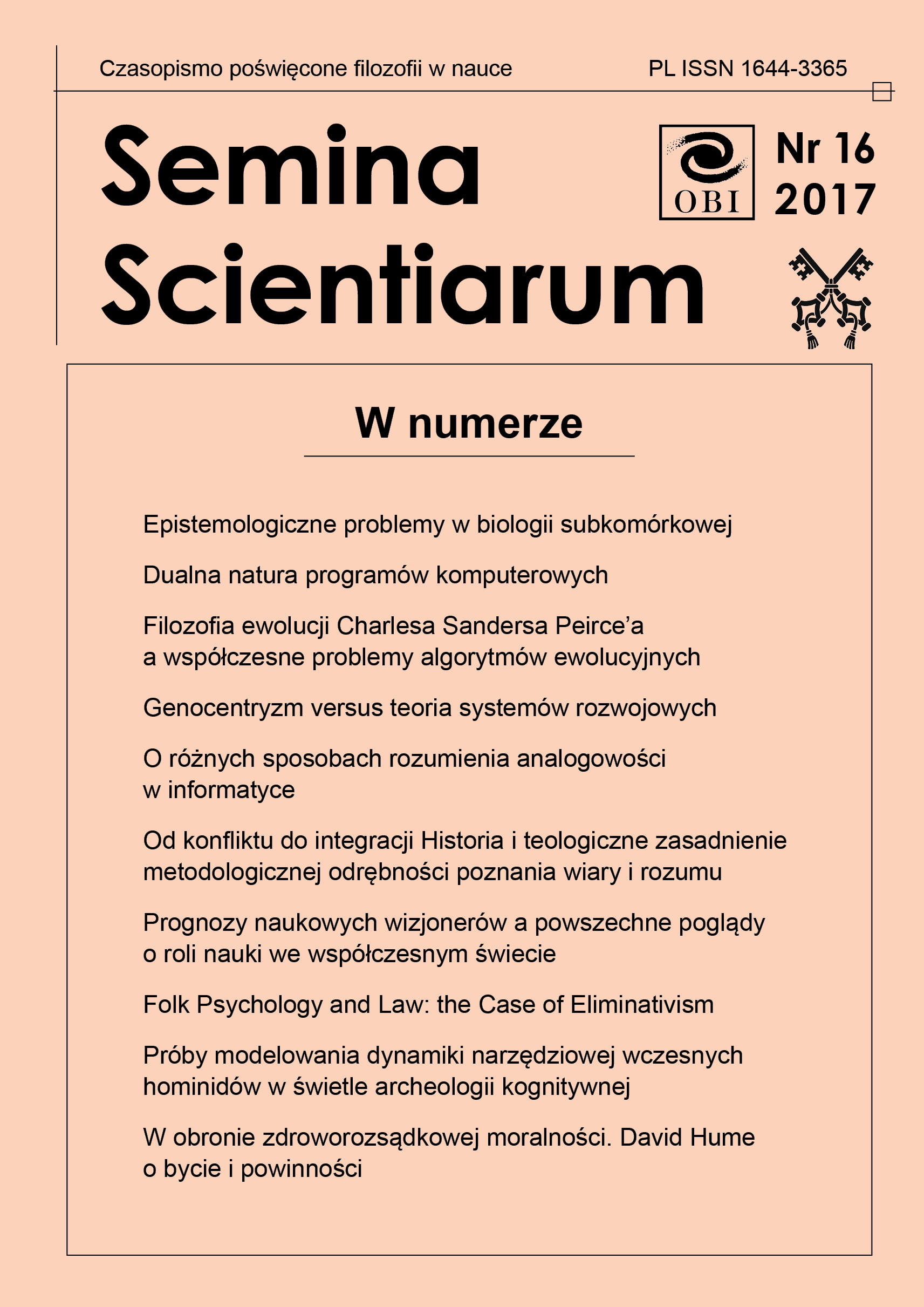Epistemologiczne problemy w biologii subkomórkowej: obserwacje, modele matematyczne i symulacje komputerowe
DOI:
https://doi.org/10.15633/ss.2482Słowa kluczowe:
experiment, observation, theory, model, numerical simulations, subcellular biologyAbstrakt
Relations between theory and empirical knowledge belong to basic problems
in philosophy of science and have been undergone detailed philosophical reflection,
including epistemological aspects. During last several dozen years,
due to development of computer technology, numerical simulations became
a common tool in natural sciences. Their epistemological aspects, however,
have not worked out yet. A specific role of computer simulations manifests
in subcellular biology, where possibilities of performing experiments and observations
are limited. Computer simulation is complementary to observation
and experiment and comes into complex relations with them. It allows us to
come to a conclusion if experiment or observations are impossible to perform.
In particular, simulations allow researchers to estimate the parameters that
cannot be measured.
Bibliografia
Bielecki A., Gierdziewicz M., Kalita P., Szostek K., Construction of a 3D Geometric
Model of a Presynaptic Bouton for Use in Modeling of Neurotransmitter
Flow, „Lecture Notes in Computer Science” 9972 (2016), s. 377–386.
Bielecki A., Kalita P., Lewandowski M., Siwek B., Numerical Simulation for
a Neurotransmitter Transport Model in the Axon Terminal of a Presynaptic
Neuron, „Biological Cybernetics” 102 (2010), s. 489–502.
Bielecki A., Kalita P., Lewandowski M., Skomorowski M., Compartment Model
of Neuropeptide Synaptic Transport with Impulse Control, „Biological
Cybernetics” 99 (2008), s. 443–458.
Bielecki A., Kalita P., Model of Neurotransmitter Fast Transport in Axon
Terminal of a Presynaptic Neuron, „Journal of Mathematical Biology”
(2008), s. 559–576.
Bielecki A., Mierzalne i niemierzalne, „Świat Nauki” 245 (2012), s. 82–83.
Brooks B. R., Bruccoleri R. E., Olafson B. D., States D. J., Swaminathan S.,
Karplus M., CHARMM: A Program for Macromolecular Energy, Minimization
and Dynamics Calculations, „Journal of Computational Chemistry”
(1982), s. 187–217.
Carnap R., Logiczna struktura świata, tłum. P. Kawalec, Warszawa 2011.
Dzik J., Dzieje życia na Ziemi, Warszawa 2003.
Futuyma D. J., Ewolucja, tłum. J. Radwan, Warszawa 2008.
Heller M., Filozofia nauki. Wprowadzenie, Kraków 2011.
Heller M., Matematyczna a filozoficzna teoria miary, „Zagadnienia Filozoficzne
w Nauce” 51 (2012), s. 152–154.
Hempel C. G., Filozofia nauk przyrodniczych, tłum. B. Stanosz, Warszawa
Hillman H., Two Problems with Cell Biology and What Should Be Done about
Them, „Biologist” 57 (2010) iss. 1, s. 40–44.
Knodel M., Geiger R., Ge L., Bucher D., Grillo A., Wittum G., Schuster C.,
Queisser G., Synaptic Bouton Properties Are Tuned to Best Fit the Prevailing
Firing Pattern, „Frontiers in Computational Neuroscience” 8 (2014)
Epistemologiczne problemy w biologii subkomórkowej… 23
art. 101, https://www.frontiersin.org/articles/10.3389/fncom.2014.00101/
full (27.11.2017).
Lakatos I., Pisma z filozofii nauk empirycznych, tłum. W. Sady, Warszawa
Lenartowicz P., Elementy filozofii zjawiska biologicznego, Kraków 1984.
Olejnik R., Matematyczna teoria miary a metodologiczne analizy procedur pomiarowych,
Tarnów 2011.
Popper K. R., Droga do wiedzy. Domysły i refutacje, tłum. S. Amsterdamski,
Warszawa 1999.
Popper K. R., Logika odkrycia naukowego, tłum. U. Niklas, Warszawa 2002.
Popper K. R., Wiedza obiektywna. Ewolucyjna teoria epistemologiczna, tłum.
A. Chmielewski, Warszawa 2002.
Solomon E. P., Berg L. R., Martin D. W., Biologia, tłum. A. Borowska i in.,
Warszawa 2014.
Wilhelm B. G., Mandad S., Truckenbrodt S., Krohnert K., Schafer C., Rammner
B., Seong J. K., Gala A. C., Krauss M., Haucke V., Urlaub H., Rizzoli S. O.,
Composition of Isolated Synaptic Boutons Reveals the Amounts of Vesicle
Trafficking Proteins, „Science” 344 (2014), s. 1023–1028.
Życiński J., Elementy filozofii nauki, Kraków 2015.
Pobrania
Opublikowane
Numer
Dział
Licencja
Twórca oświadcza, że przysługują mu prawa autorskie do utworu i że nie są ograniczone w zakresie objętym niniejszym oświadczeniem oraz że utwór jest dziełem oryginalnym i nie narusza praw autorskich innych osób.
Twórca zezwala Uniwersytetowi Papieskiemu Jana Pawła II w Krakowie na nieodpłatne, niewyłączne i nieograniczone w czasie korzystanie z utworu, to jest:
- utrwalanie i zwielokrotnianie: wytwarzanie egzemplarzy utworu techniką drukarską, reprograficzną, zapisu magnetycznego oraz techniką cyfrową;
- obrotu oryginałem albo egzemplarzami, na których utwór utrwalono (wprowadzanie do obrotu, użyczenie lub najem oryginału albo egzemplarzy, publiczne wystawienie, wyświetlenie, a także publiczne udostępnianie utworu w taki sposób, aby każdy mógł mieć do niego dostęp w miejscu i w czasie przez siebie wybranym);
- włączenie utworu w skład utworu zbiorowego;
- udzielanie przez Uniwersytet Papieski Jana Pawła II w Krakowie sublicencji Creative Commons Uznanie autorstwa-Użycie niekomercyjne-Bez utworów zależnych 3.0 Polska
Uniwersytet Papieski Jana Pawła II w Krakowie udostępnia utwór na Platformie Czasopism należącej do uczelni, na licencji Creative Commons Uznanie autorstwa-Użycie niekomercyjne-Bez utworów zależnych 3.0 Polska. Tym samym uprawnia wszystkich zainteresowanych do korzystania z utworu pod następującymi warunkami:
- zostanie podany autor i tytuł utworu,
- zostanie podane miejsce publikacji (tytuł czasopisma i adres internetowy do oryginalnie opublikowanego utworu),
- utwór będzie dystrybuowany w sposób niekomercyjny,
- nie będą tworzone utwory zależne.

